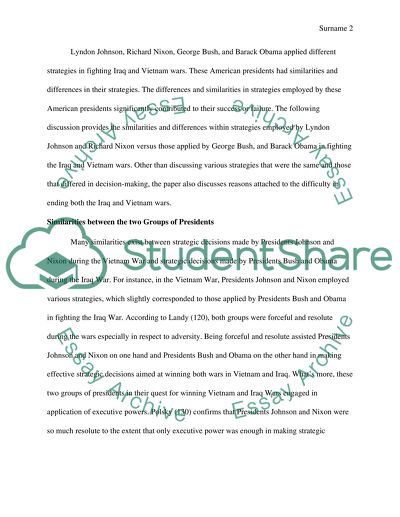Cite this document
(“Compare and contrast the decision-making of Lyndon Johnson and Richard Essay”, n.d.)
Retrieved from https://studentshare.org/history/1587040-compare-and-contrast-the-decision-making-of-lyndon-johnson-and-richard-nixon-in-the-vietnam-war-with-that-of-george-w-bush-and-barack-obama-in-the-iraq-war-what-did-they-share-what-was-different-why-was-ending-both-wars-so-difficult
Retrieved from https://studentshare.org/history/1587040-compare-and-contrast-the-decision-making-of-lyndon-johnson-and-richard-nixon-in-the-vietnam-war-with-that-of-george-w-bush-and-barack-obama-in-the-iraq-war-what-did-they-share-what-was-different-why-was-ending-both-wars-so-difficult
(Compare and Contrast the Decision-Making of Lyndon Johnson and Richard Essay)
https://studentshare.org/history/1587040-compare-and-contrast-the-decision-making-of-lyndon-johnson-and-richard-nixon-in-the-vietnam-war-with-that-of-george-w-bush-and-barack-obama-in-the-iraq-war-what-did-they-share-what-was-different-why-was-ending-both-wars-so-difficult.
https://studentshare.org/history/1587040-compare-and-contrast-the-decision-making-of-lyndon-johnson-and-richard-nixon-in-the-vietnam-war-with-that-of-george-w-bush-and-barack-obama-in-the-iraq-war-what-did-they-share-what-was-different-why-was-ending-both-wars-so-difficult.
“Compare and Contrast the Decision-Making of Lyndon Johnson and Richard Essay”, n.d. https://studentshare.org/history/1587040-compare-and-contrast-the-decision-making-of-lyndon-johnson-and-richard-nixon-in-the-vietnam-war-with-that-of-george-w-bush-and-barack-obama-in-the-iraq-war-what-did-they-share-what-was-different-why-was-ending-both-wars-so-difficult.


